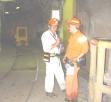At the coal face of the dot.commodity supply problem
 pany executive about the current demand for iron ore, they'll say it's more than just strong. Nearly every one of them will use the word "unprecedented".
pany executive about the current demand for iron ore, they'll say it's more than just strong. Nearly every one of them will use the word "unprecedented"."If you spoke to us three years ago, no one would have predicted this," says Ralph Holmes, manager of iron ore processing for CSIRO's minerals division."

"We can't get enough tradesman to keep the equipment running as well as possible," Morgan says. "And every minute the plant is down is critical."
Rio's problem is that there are a finite number of mechanics and electricians in Australia.... And the problem isn't limited to maintenance workers. Geologists and engineers are also in high demand these days.
"It was a different story back in 2002 when Morgan completed his degree. He applied for positions with 30 different companies and got one interview. He accepted a job in early 2003 in the remote Pilbara town of Tom Price, then the home of about 3000 company employees. Flash forward two years, and more than 4500 live in Tom Price. Rio recently converted Marandoo, a mine near Tom Price, to a fly-in, fly-out operation with workers based in Perth to s
 tem the housing crunch and to accommodate growing lifestyle demands from mining workers who now have the upper hand in negotiations with employers. The shortage of workers is so severe that contracted truck operators can easily demand salaries above $100,000.
tem the housing crunch and to accommodate growing lifestyle demands from mining workers who now have the upper hand in negotiations with employers. The shortage of workers is so severe that contracted truck operators can easily demand salaries above $100,000.Recruitment of skilled mining workers is tough because geology and engineering aren't "trendy" subjects to study at university. And universities have therefore cut back on courses in those areas, creating a downward spiral.
Offering huge amounts of money to young miners only helps to a limited extent. It's the convenience of living in capital cities close to family and friends that attracts more Australians to fields such as finance or law or IT rather than mining. As Rio chief scientist Dr Robin Batterham notes: "The population you can call on to work in iron ore [in industrialised nations] has been diminishing since 1920."
The skills shortage is so severe that Australian recruitment agencies are setti
 ng up shop in places like South Africa to attract mining personnel to Western Australia. Mining hotbeds in the Americas such as Canada and Chile have also been targeted. And as Dr Tapan Majunder, an professor of applied geology at the Indian School of Mines, told the Herald at the Iron Ore 2005 conference in Fremantle earlier this week, some companies are recruiting from less traditional regions. "A lot of [Indians] have come to Australia," he said. "There are two [former] students of mine in this room."
ng up shop in places like South Africa to attract mining personnel to Western Australia. Mining hotbeds in the Americas such as Canada and Chile have also been targeted. And as Dr Tapan Majunder, an professor of applied geology at the Indian School of Mines, told the Herald at the Iron Ore 2005 conference in Fremantle earlier this week, some companies are recruiting from less traditional regions. "A lot of [Indians] have come to Australia," he said. "There are two [former] students of mine in this room.""Matthew Cobbett, mining business development director at engineering services firm Fluor, says employment at his company's iron ore division, which does work for BHP, has jumped from 200 to 450 in the past few years.
"The skills shortage is certainly an issue in all of the projects we are chasing," he says. Dr Stuart Ratcliffe, Cobbett's counterpart at rival Sinclair Knight Merz, says Perth's engineering capability is close to capacity. "The demand on e
 ngineering resources in Western Australia, and mirror-imaged in Brisbane for coal, is unprecedented," he says. His firm has 600 people based in Perth working on iron ore projects for Rio and BHP, up from about 300 a few years ago.
ngineering resources in Western Australia, and mirror-imaged in Brisbane for coal, is unprecedented," he says. His firm has 600 people based in Perth working on iron ore projects for Rio and BHP, up from about 300 a few years ago. Labels: Commodities

2 Comments:
Hi, just thought that I'd drop in to let you know that am a reader. Don't fully understand half of what you write about but find it very interesting. Cheers, D
Thanks, wombat wol. We thrive on the thought there may be someone like you out there -- actually that there may be some very many like you :-)
My wife looks at the blog. She likes the pictures. Especially thought Yoda Greenspan was "cute" and appreciated the artistry of the marbles.
Stew, Guambat Stew
Post a Comment
<< Home